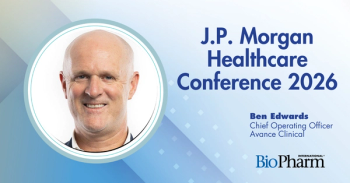
- BioPharm International-06-01-2009
- Volume 22
- Issue 6
UK Service Providers Look to the New World
UK-based CMOs seek opportunities in new markets.
The decline of financial support for the biopharmaceutical industry has been a huge blow to the contract research and manufacturing industries. According to the National Venture Capital Association, venture capital (VC) funding for the biopharmaceutical industry in the US dropped 46% in the first quarter of 2009, to just $577 million; it had averaged over $1 billion per quarter throughout this decade.
Jim Miller
That funding shortfall is being felt directly by contract research organizations (CROs) and contract manufacturing organizations (CMOs), especially those that offer early development support and process development and manufacture for clinical trial materials. We are starting to see CROs and CMOs laying off staff, and some actually closing their doors, as their business volume takes a precipitous fall.
As bad as it is in the US, however, it is worse in the UK and continental Europe. VC funding for biotech, which has always been weaker in Europe than in North America, was down 20% in Europe in 2008. According to a recent survey by the BioIndustry Association, the biotechnology industry's trade association in the UK, 76% of companies looking to raise equity in the past 12 months had difficulty doing so, with nearly 40% of those unable to raise funding at all. The situation in the UK appears to be especially bleak because the track record there is so poor. According to one source we talked to recently, only two biopharmaceuticals developed in the UK have ever achieved commercial approval, and only one of those, UCB's Cimzia, has been commercially successful.
CROs LOOK ABROAD
Given the difficult market conditions at home, it isn't surprising that UK-based CROs and CMOs are focusing their business development efforts outside the country, especially in North America. I recently toured the operations of several CROs and CMOs in the UK and talked with their executives about market conditions and their response to them.
Eden Biodesign, located in Liverpool, reflects the recent history of the UK biopharmaceutical industry. Originally established as a consultancy by several veterans of the biotechnology industry, Eden won the contract to operate the UK's National Biotechnology Center (NBC) in 2003. The NBC was funded by a £30-million grant from national and local government agencies to offer biotech startups and university-based researchers in the UK a facility to provide process development and early-stage research and clinical materials. Eden's founders raised an additional £5 million in working capital to operate the site.
The NBC is a 4,100 sq. m. facility with capabilities in process development and clinical manufacturing using mammalian cell culture (up to 200 L), microbial fermentation (up to 100 L), and viral production technologies. After the facility opened in 2006, Eden worked with a broad array of early-stage companies and university-based programs, many benefiting from a £3 million government fund established to provide grant support to early-stage biopharmaceutical companies.
The grant support program came to an end at the end of 2008, and although the UK government is establishing new programs to support biotechnology as part of its economic stimulus program, Eden is now looking beyond the UK, targeting early-stage and major biopharmaceutical companies in Europe and the North America. They have established a business development team in the US and are hosting visits from global biopharmaceutical companies. In this regard, they are following a trail blazed by other UK biomanufacturers, including the Oxford-based Cobra Biomanufacturing and Billingham-based Avecia, which get the majority of their revenues from companies located outside the UK.
QUALIFIED PERSON SERVICES
An important avenue of growth for the UK-based companies is their ability to provide access to the European market and clinical sites. The EU requires that pharmaceuticals imported into its member countries be certified as GMP-compliant by a Qualified Person (QP), a formal title for professionals who have been trained and credentialed to audit manufacturers. A number of UK-based CROs and CMOs, as well as the UK-based operations of some global companies like Fisher Clinical, Almac, and Aptuit, have taken advantage of the QP requirement to grow their UK-based operations.
Penn Pharmaceutical Services, located in Tredegar, Wales, has built a significant service offering around the QP requirement. The company has seven QPs onsite, and provides QP release for a broad array of products and clinical trial materials imported into the UK for distribution there and elsewhere in the EU. Penn's diversified capabilities include formulation and analytical development, dose manufacturing, packaging, and consultancy. It also has a thriving business manufacturing "specials," unapproved products that are a unique opportunity in the UK.
With limited prospects locally, Penn has established a significant business development presence in the US in recent years. It also has established an alliance with US-based clinical packager Xerimis (Moorestown, NJ) for which it provides UK-based services.
EXPLOITING NICHES
Another strategy pursued by UK-based CROs and CMOs to broaden their market opportunities is to exploit specialized scientific capabilities. This is the path being pursued by Pharmaterials, based in Reading. Founded by a university-based scientist, Pharmaterials has specialized expertise in solid state chemistry for the analysis of the alternative polymorphs and salts of small-molecule compounds. This has become an increasingly important discipline in recent years for solving solubility challenges and for intellectual property protection. It also is working with companies to develop formulations of poorly soluble compounds. Acquired by US-based Pharmaceutics International in 2008, the company recently opened a new facility for laboratories and manufacture of early-stage clinical supplies. Business from companies outside of the UK already accounts for 60% of its revenues.
The experience of these UK-based CROs and CMOs is instructive. They have been forced by shrinking opportunities at home to look beyond their natural markets for survival and growth. They have made the investment in time and money to build understanding of new markets and create a presence in them. As the funding crisis shrinks the base of biopharmaceutical companies, all CROs and CMOs will be forced to look beyond their traditional capabilities and customer bases if they are to survive the downturn.
Jim Miller is president of PharmSource Information Services, Inc. , Springfield, VA, 703.383.4903,
Articles in this issue
over 16 years ago
Biological Potency Assays are Key to Assessing Product Consistencyover 16 years ago
Stiffer Enforcement at the FDAover 16 years ago
The Ups and Downs of the FDA Budgetover 16 years ago
Using Fluorescence-Based Sensing to Accelerate Process Developmentover 16 years ago
User Viewpoints on Disposables ImplementationNewsletter
Stay at the forefront of biopharmaceutical innovation—subscribe to BioPharm International for expert insights on drug development, manufacturing, compliance, and more.




